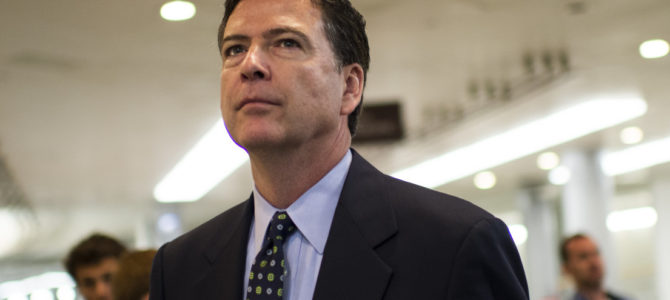
According to a CNN source, former FBI director James Comey plans to testify in front of the Senate to “confirm” allegations that President Donald Trump obstructed an investigation into Michael Flynn’s ties to Russia. It’s obvious how public testimony at this point will help Comey, but how does it help the investigation into alleged Russian collusion or related crimes?
If the Senate Intelligence Committee is interested in ferreting out the truth, it would ask Comey to formally sit down with Special Counsel Robert Mueller and let him conclude his investigation before Comey testifies in front of the Senate. Otherwise, his appearance promises to be a clown show.
We don’t know exactly what he’s going to say, of course, but it’s been reported that Trump met with Comey a few days after Flynn was fired. The FBI director, who apparently keeps meticulous records of all his conversations, noted that the president asked for his “loyalty” but Comey “demurred.” When the Flynn investigation came up, Trump reportedly said, “I hope you can let this go. I hope you can see your way clear to letting this go, to letting Flynn go. He is a good guy.”
If true, Trump’s comments are, at the very least, stupid and inappropriate, and a case of incredibly bad judgment, especially when one considers the situation swirling around the administration in those days (and today). That said, alone, they fall well short of “obstructing” an investigation.
I know this because in his May 8 testimony, then-FBI director James Comey said so. Not only did he assure the Senate, under oath, that higher-ups had never told him to “stop investigating” a case, but also that higher-ups often pressed him on investigations they thought were a waste of time.
Sen. Mazie Hirono to Comey: “So if the attorney general or senior officials at the Department of Justice opposes a specific investigation, can they halt that FBI investigation?”
Comey: “In theory, yes.”
Hirono: “Has it happened?”
Comey: “Not in my experience. Because it would be a big deal to tell the FBI to stop doing something like that — without an appropriate purpose.
I mean where oftentimes they give us opinions that we don’t see a case there and so you ought to stop investing resources in it. But I’m talking about a situation where we were told to stop something for a political reason; that would be a very big deal. It’s not happened in my experience” (italics mine).
“It’s not happened in my experience” sounds pretty definitive. Now, I’ve seen some people argue that Comey was only speaking about an “attorney general or senior officials.” This Clintonian parsing of words doesn’t stand up to logic. If it’s a “very big deal” for the AG to stop an investigation, it would be doubly so for a president to attempt it. Meaning, Comey would obviously have an ethical responsibility to bring up this historic illegality.
So, did he ever mention this Nixonian moment to his top people — say, his deputy? If he had, why did interim FBI Director Andrew McCabe, a Comey loyalist, deny there was interference? Sen. Marco Rubio asked McCabe during testimony if the investigation had been “impeded, interrupted, stopped or negatively impacted,” and the interim director replied that “there has been no effort to impede our investigation to date.”
Perhaps new evidence can justify Comey’s initial testimony. Perhaps in context, Trump’s comments to Comey will turn out to be worse than we think. I’m open to that possibility. But if you’re going to accuse a sitting president of a high crime, you have a responsibility to explain the discrepancy in your testimony. You also have a duty to answer a wide range of questions, not only the ones that benefit your public image. Yet Comey probably won’t be able to do so.
According to CNN, Comey has spoken with his former colleague at the Justice Department, Mueller, to work out the parameters of his testimony to ensure that “there are no legal entanglements as a result of his public account.” What’s the point of allowing Comey to make an accusation about obstruction publicly but then also allowing him to avoid pertinent questions whenever he likes? There would be no such restriction in a formal interview with Mueller — which could be shared with the Senate anyway.
Isn’t this why we invented politically impartial special counsels? For Trump’s critics, the public testimony will merely confirm their worst suspicions. For Trump’s defenders, it will look like a revenge-seeking bureaucrat came forward because he was fired. Under these conditions, it seems a lot more like reputation-saving than justice-seeking.









